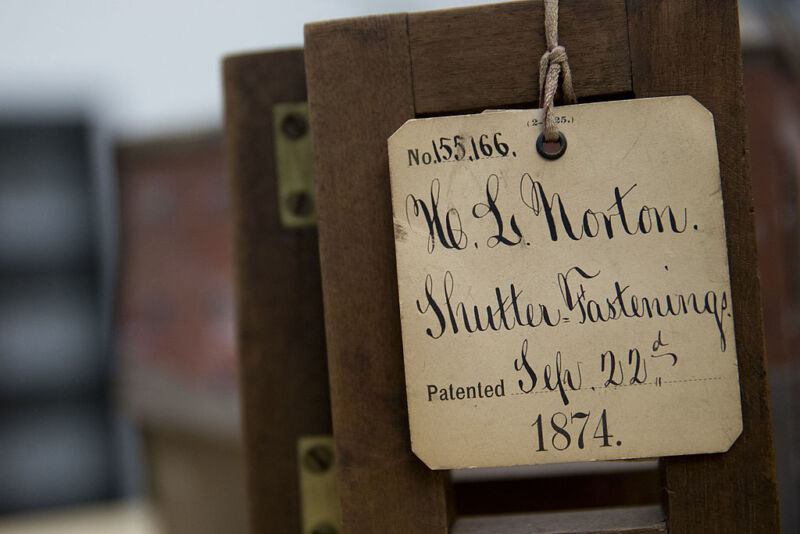Patently retro —
PERA and PREVAIL want to re-enable patents struck down by Supreme Court rulings.

Enlarge / An image from the U.S. Patent and Trademark Office, where in 1874, the newest thing was not software or genetic compositions, but shutter fastenings from H.L. Norton.
Andrew Harrer/Bloomberg via Getty Images
The Senate Judiciary Committee is scheduled to consider two bills Thursday that would effectively nullify the Supreme Court’s rulings against patents on broad software processes and human genes. Open source and Internet freedom advocates are mobilizing and pushing back.
The Patent Eligibility Restoration Act (or PERA, S. 2140), sponsored by Sens. Thom Tillis (R-NC) and Chris Coons (D-Del.), would amend US Code such that “all judicial exceptions to patent eligibility are eliminated.” That would include the 2014 ruling in which the Supreme Court held, with Justice Clarence Thomas writing, that simply performing an existing process on a computer does not make it a new, patentable invention. “The relevant question is whether the claims here do more than simply instruct the practitioner to implement the abstract idea of intermediated settlement on a generic computer,” Thomas wrote. “They do not.”
That case also drew on Bilski v. Kappos, a case in which a patent was proposed based solely on the concept of hedging against price fluctuations in commodity markets.
Open source groups hunker down
Software and Internet advocates have taken notice. This week, the Linux Foundation, working with the Cloud Native Computing Foundation (CNCF), announced an expanded partnership with Unified Patents, intended to defend open source software against what it gamely calls “non-practicing entities” (NPEs), but most people would term patent trolls. “As the risk and volume of frivolous litigation against open source projects grows, the need to provide accessible protection from NPEs has become crucial,” the Linux Foundation writes.
In interviews with The Register, leaders at CNCF and Unified Patents described patent trolls as actively chasing any widespread technology, aiming for settlements over the cost of trials. Nearly 98 percent of NPE claims are settled, according to Unified Patents, but NPE claims challenged at the US Patent and Trademark Appeals Board lose 67 percent of the time.
Challenging patent claims, however valid, could get tougher under the PREVAIL Act, the other bill being considered by the Senate Judiciary Committee this week. PREVAIL would, among other changes, limit patent challenge petitions to 14,000 words, hampering attempts to debunk complex patents. The Act would also eliminate clearance patents, which companies can use to clear any infringement claims prior to their own products’ release.
Clearing the way for genome patents
Another wrinkle in the PERA bill involves genetic patents. The Supreme Court ruled in June 2013 that pieces of DNA that occur naturally in the genomes of humans or other organisms cannot, themselves, be patented. Myriad Genetics had previously been granted patents on genes associated with breast and ovarian cancer, BRCA1 and BRCA2, which were targeted in a lawsuit led by the American Civil Liberties Union (ACLU). The resulting Supreme Court decision—this one also written by Thomas—found that information that naturally occurs in the human genome could not be the subject to a patent, even if the patent covered the process of isolating that information from the rest of the genome. As with broad software patents, PERA would seemingly allow for the patenting of isolated human genes and connections between those genes and diseases like cancer.
The Electronic Frontier Foundation (EFF) describes PERA and PREVAIL as “a huge gift to patent trolls, a few tech firms that aggressively license patents, and patent lawyers. For everyone else, it will be a huge loss.” The EFF maintains a collection of stories of people claiming their jobs or avocations were “Saved by Alice” (the Supreme Court ruling).
The Judiciary Committee is set to debate and potentially amend or rewrite PREVAIL and PERA (i.e. mark up) on Thursday. Tillis told Axios that the bills are necessary for “Biotech, a number of emerging sectors [needing] relief, or we’re just going to stifle innovation.” Most Judiciary Committee members have not indicated their votes on the bills. Pharmaceutical trade group PhRMA supports the bills, while numerous advocates for lower-cost drugs and biosimilars oppose them.